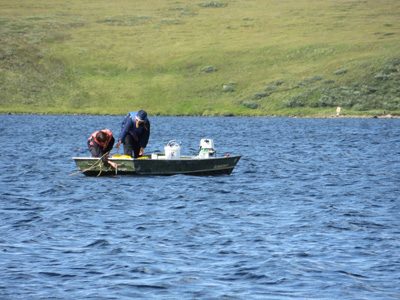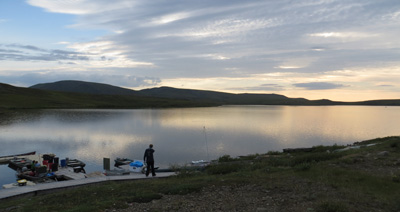Campus News
Methane in Arctic lake traced to groundwater from seasonal thawing
Groundwater from seasonal melting may be an important contributor to emissions of methane, a potent greenhouse gas, from Arctic lakes



Global warming may ramp up the flow of methane from groundwater into Arctic lakes, allowing more of the potent greenhouse gas to bubble out into the atmosphere, according to a new study led by researchers at UC Santa Cruz.
Scientists have long known that Arctic lakes emit methane, which comes primarily from the action of microbes in the water and lake sediments. Although numerous studies have monitored and documented these emissions, few have examined the effects of seasonally thawed groundwater, which also contains methane and flows into the lakes.
Adina Paytan, a research scientist at UC Santa Cruz, led a team of researchers to study methane concentrations at Toolik Lake, Alaska. Their findings, published March 9 in Proceedings of the National Academy of Sciences, show that groundwater from the seasonal thawing of the “active layer” of soil above the permafrost adds significantly to the overall concentration of methane in the lake and thus influences the emission of this powerful greenhouse gas to the atmosphere.
“Methane transport from the active layer to Toolik Lake can account for a large fraction of methane emissions from this lake,” Paytan said. “This is important because warming in the Arctic may expand the active layer and increase the discharge, leading to increased emissions from Arctic lakes and driving additional global warming.”
Although carbon dioxide accounts for the vast majority of greenhouse gas emissions from human activities, methane emissions are also an important factor driving climate change. Methane doesn’t last as long in the atmosphere, but it is much more efficient than carbon dioxide at trapping heat. Pound for pound, the effect of methane on climate change is more than 20 times greater than carbon dioxide over a 100-year period, according to the Environmental Protection Agency.
At Toolik Lake, Paytan and her colleagues tracked methane concentrations concurrently with two naturally occurring elements (radon and radium) that serve as tracers for groundwater. Based on their measurements, they concluded that methane-rich groundwater may be an important and currently unrecognized contributor to methane emissions from Arctic lakes. The study suggests that future warming in the Arctic could expand the active layer and increase methane transport to lakes, and from lakes into the atmosphere, exacerbating global warming.
In addition to Paytan, the coauthors of the paper include Alanna Lecher, Joseph Murray, and Slawek Tulaczyk at UC Santa Cruz; Natasha Dimova at UC Santa Cruz and the University of Alabama; and Katy Sparrow, Fenix Kodovska, and John Kessler at the University of Rochester. This research was funded by the National Science Foundation.